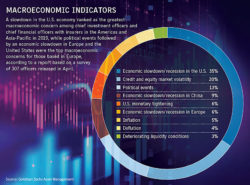It’s the economy, stupid.
James Carville’s infamous campaign slogan in Bill Clinton’s 1992 presidential election victory against George H.W. Bush — a victory that some credit in part to the 1990 recession and the ability of the Clinton campaign to blame the incumbent president for the lingering economic weakness — has endured and been referenced many times in the nearly three decades since Mr. Carville coined the phrase.
In Washington and across the country, there’s now open speculation about whether President Donald Trump will take the fall for the next recession.
Of course, part of this speculation is driven by the fact that many of the nearly two dozen Democratic presidential candidates campaigning are publicly expressing concern over the fragility of the U.S. economy and the impact of President Trump’s tariff standoff with China.
Whether or not a recession occurs obviously has implications for insurers. A U.S. recession was predicted to be a near-term event, but not a 2019 event, according to a report released in April by Goldman Sachs Asset Management based on a survey of 307 chief investment officers and chief financial officers at insurers that invest more than $13 trillion in balance sheet assets. But those survey findings were current as of Feb. 26, and I can’t help but wonder what these financial leaders are thinking right now.
“Insurers have benefited from a decade-long economic expansion, and the economy is still strong.
However, mounting trade risks are a concern, and could be fodder for an economic downturn in the U.S. that could spread globally,” Moody’s Investors Service Inc. said in a report summarizing the discussion at its U.S. Insurance Conference 2019 in New York in June.
Most of the concern about a potential recession to date appears to be focused on life insurers. Economic volatility may increase given the current geopolitical, interest rate and equity market environment — shades of the 2008-2009 financial crisis, A.M. Best Co. Inc. said in a June report that noted the migration of life/annuity insurers’ investment portfolios to higher-risk assets. “These same concerns hold, but we believe the industry is more resilient,” Best stated.
The implications for the property/casualty insurance industry bear watching, including whether a recession would have an effect on the sector’s ability to secure premiums that more accurately reflect the rising risks they are facing. Strong capital positions and ample liquidity enabled property/casualty insurers and reinsurers to withstand 2018 catastrophe losses driven by another active Atlantic hurricane season and the most destructive California wildfire season on record, the Goldman Sachs Asset Management report noted. Insurers are beginning to push rate increases partly in response to the sizable catastrophe losses, as several reported during the last round of earnings conference calls, but the acceleration of rate increases was not across all lines of business and was just slightly outpacing loss trends on some lines.
Our political leaders will continue to play the blame game if the economy falters, and that could hinder efforts to prevent the U.S. economy from tumbling into a severe recession — not good news for insurers and their risk manager clients.



